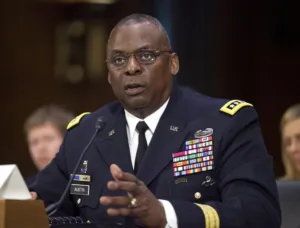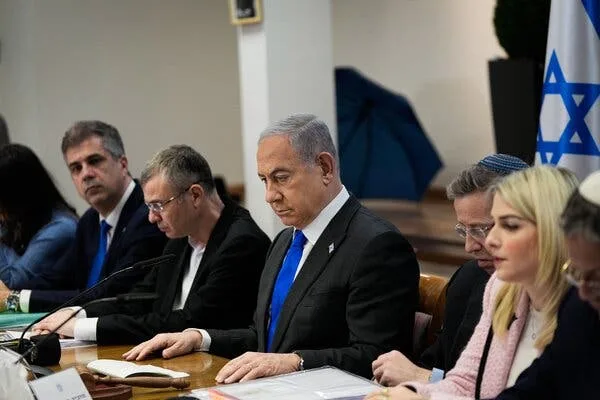Israeli Prime Minister Benjamin Netanyahu has allegedly obtained complete clearance from his war cabinet to undertake both offensive and defensive measures against Hezbollah, marking a significant escalation of hostilities in the Middle East. This authorization, bestowed by Israel’s foremost military and political leaders, signifies a pivotal moment in the enduring conflict between Israel and the Lebanese militant organization, Hezbollah. Reports indicate that the Israeli military is poised for the potential of a full-scale war, while the U.S. is vigilantly observing the situation due to concerns of an expanded regional conflict.
Israeli media site Kann reports that Netanyahu’s war cabinet has authorized military action, permitting him to initiate a pre-emptive or retaliatory strike against Hezbollah at his discretion. This decision is perceived as a reaction to the escalating threat presented by Hezbollah’s expanding military capabilities and its nearness to Israel’s northern border. Simultaneously, the Wall Street Journal (WSJ) has disclosed that U.S. Secretary of Defense Lloyd Austin has apprised Congressional leaders of escalating apprehensions regarding a potential Israeli incursion into Lebanon, indicating the gravity of the circumstances.
Hezbollah, a Shiite militant group with political clout in Lebanon, has consistently been a principal opponent of Israel. Hezbollah, backed by Iran, has a vast stockpile of rockets, missiles, and other sophisticated armaments, rendering it one of the most powerful non-state entities in the region. Israel has accused the group of accumulating weaponry in civilian zones and utilizing Lebanese territory as a launchpad for assaults against Israel. This has resulted in a precarious standoff, characterized by intermittent conflicts between the two factions.
Tensions between Israel and Hezbollah have periodically escalated since the last significant confrontation in 2006, which caused extensive devastation in Lebanon and substantial losses for both parties. The present circumstances seem exceptionally unstable, with Israeli military authorities cautioning about an elevated likelihood of a broader conflict. Hassan Nasrallah, the military head of Hezbollah, has consistently pledged retaliation against any Israeli aggression, heightening concerns of a potentially uncontrollable battle.

In recent weeks, Israeli armed personnel have reportedly undertaken intensive exercises near the northern border, simulating scenarios of a comprehensive conflict with Hezbollah. These exercises, encompassing ground soldiers, air force, and special forces groups, aim to prepare Israel for a hypothetical incursion into southern Lebanon, where Hezbollah is thought to have established fortified positions and an extensive tunnel network.
Netanyahu’s war cabinet endorsement indicates that Israel is considering a pre-emptive strike on Hezbollah’s infrastructure, specifically targeting missile-launching locations and weapons stores. Analysts have observed that this operation may be intended to diminish Hezbollah’s military capabilities before their deployment in an assault on Israeli urban centers and civilian populations.
Israeli officials have not clearly defined the conditions for initiating a military strike; however, many speculate that a decisive factor may arise if Hezbollah intensifies provocations or if information suggests an impending attack on Israel. Netanyahu’s administration has unequivocally stated its intolerance for any risks to Israel’s security, with the prime minister frequently underscoring the necessity for the nation to be watchful against adversaries.

Hezbollah has pledged to retaliate vigorously against any Israeli aggression. Hassan Nasrallah, the leader of the group, has publicly asserted that Hezbollah’s stockpile of rockets and missiles can reach deep into Israel, targeting significant cities such as Tel Aviv and Haifa. This potential has consistently raised apprehensions among Israeli military strategists, who worry that a comprehensive fight with Hezbollah may lead to significant civilian losses and extensive devastation.
In recent years, Hezbollah has enhanced its military capabilities with Iranian assistance, which has provided the group with sophisticated weaponry, including precision-guided missiles. These armaments present a significant threat to Israel’s defensive mechanisms, and there are apprehensions that a battle with Hezbollah might rapidly evolve into a wider regional confrontation, involving additional entities such as Syria and Iran.
The participation of the United States exacerbates the issue. The United States has always been a steadfast supporter of Israel, offering substantial military and diplomatic assistance to the Israeli government. Nevertheless, Washington is cautious about becoming entangled in another extended confrontation in the Middle East, especially as the Biden administration prioritizes other global issues, such as the war in Ukraine and relations with China.

The Wall Street Journal reports that Secretary of Defense Lloyd Austin has informed Congressional leaders about the situation, voicing apprehensions on the possibility of an Israeli offensive igniting a broader conflict. Austin emphasized the necessity of sustaining open communication channels between the U.S. and Israeli administrations as the situation develops.
The potential for a comprehensive conflict between Israel and Hezbollah has elicited significant apprehension from the global community. The United Nations and European Union have also urged prudence, imploring both parties to refrain from measures that may exacerbate violence. Lebanon, already facing significant political and economic challenges, is inadequately prepared to manage the repercussions of another conflict with Israel. The nation’s infrastructure is precarious, and the Lebanese populace has suffered significantly from previous conflicts with Israel.
Middle Eastern nations are anxiously monitoring the developments. Iran, Hezbollah’s principal supporter, has unequivocally stated its intention to assist its friend in the case of hostilities, heightening concerns of an expansive regional confrontation involving other participants. Iran has consistently engaged in conflict with Israel via proxy forces, and its participation in a possible Hezbollah-Israel war may markedly intensify the situation.
With Israel’s war cabinet granting Netanyahu complete authorization to initiate military operations against Hezbollah, the Middle East teeters on the edge of yet another conflict. The Israeli government’s resolution to prepare for a potential offensive underscores the escalating apprehension regarding Hezbollah’s military augmentation and the peril it presents to Israel’s security. Hezbollah’s threats of retribution indicate that any conflict might rapidly escalate into a broader regional war.
As both parties prepare for engagement and global stakeholders observe the circumstances, the forthcoming days will be pivotal in ascertaining whether Israel and Hezbollah can avert a disastrous confrontation or if the region will be reimmersed in turmoil. The human toll of such a conflict would be substantial, with civilian populations on both sides ensnared in the crossfire.
Follow us on social media: Instagram, Threads & Twitter X @nya360_ YouTube & Facebook @nya360.





